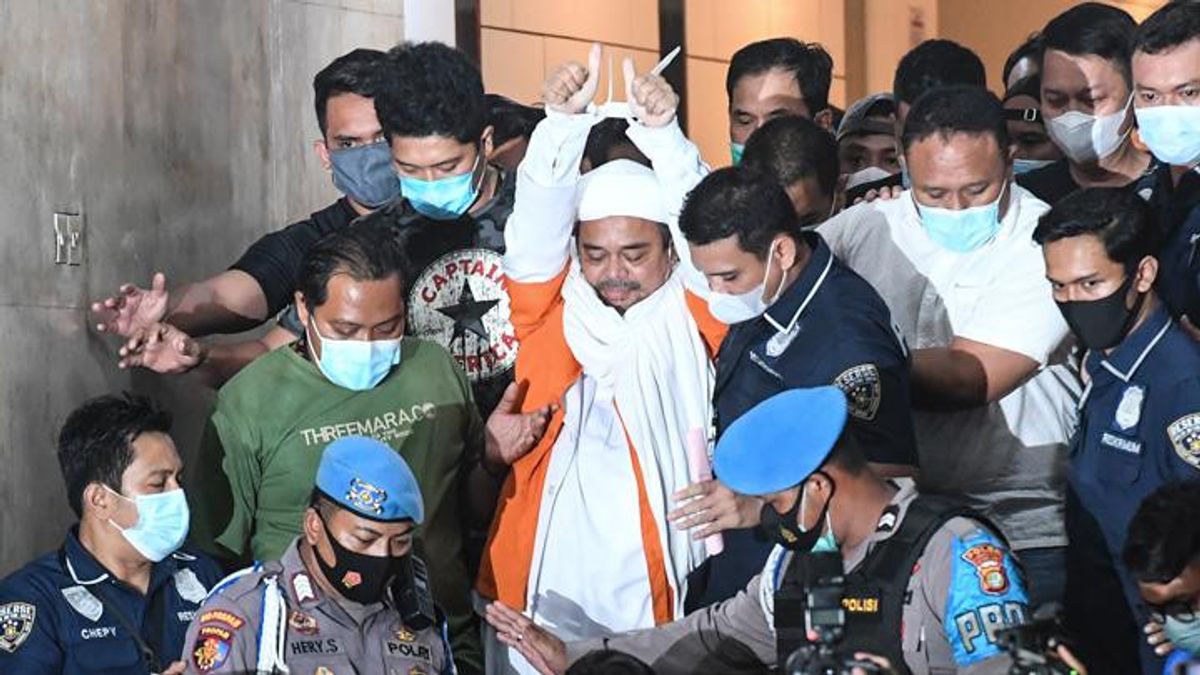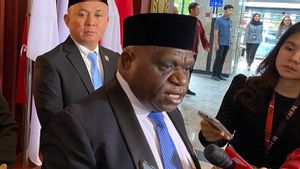JAKARTA - Rizieq Shihab's popularity as the high priest of the Islamic Defenders Front (FPI) is indeed extraordinary. His actions in enforcing "amar ma'ruf nahi munkar" often provoke controversy. His instructions are to perpetuate the anti-immoral movement by closing places of immorality, for example.
This bold act was followed by hate speech to the country. As a reward, Rizieq was imprisoned in 2003. However, prison did not change many things.
"Prison is like a vacation to Taman Mini Indonesia Indah," he said.
“Amar ma'ruf nahi mungkar” or “enforce what is right and forbid what is wrong” is the breath of every movement of Islamic organizations in Indonesia. Rizieq Shihab didn't want to be left behind either. He adopted the spirit of defending the truth to create a platform that became a beacon for the movement of Indonesian Muslims.
He also together with a number of scholars, haba'ib, and Muslim activists wanted to convene a community organization in 1998. FPI, its name. Maybe there is nothing wrong with FPI's intention to defend the truth. Especially when it comes to defending Islam. In fact, FPI's actions often provoke controversy. In fact, since its inception.

The ABRI commander at the time, Wiranto, involved FPI as part of the operation to secure the MPR Special Session under the umbrella of PAM Swakarsa. After the New Order (Orba), FPI wanted to try to release Pam Swakarsa's image. They want to grow independent and dedicate their attention to protecting Indonesian Muslims from bad influences. From the influence of western culture to immorality.
Enforcement that makes FPI often known with two approaches. Sometimes the anarchist approach is often controversial. Sometimes also humanist style. FPI is the leading mass organization that immediately goes to help victims of injustice and natural disasters.
“A variety of religious militias and vigilante groups such as the FPI also stand out. They claim to have a mandate to protect the local Muslim community from obscenity, moral decay, and freedom beyond the limits they believe grew along with the post-Orba transitional period.”
“As one FPI chairman explained, democracy opens the door for change, the problem is it opens doors for all kinds of people and all kinds of things. Pornography, homosexuals, apostasy, all forms of fields and deviations," said Ian D.
Rizieq Shihab ImprisonedFPI's journey to win the hearts of Muslims is full of twists and turns. This mass organization is often known as a dominantly controversial organization, rather than humanist. Rizieq Shihab, moreover. At the end of 2003, he was proven to have violated Article 160 junto Article 65 paragraph 1 of the Criminal Code and Article 154 of the Criminal Code.
Rizieq Shihab was legally and convincingly proven to have committed verbal and written incitement in public. It has also spread hostility, hatred, and contempt for the Indonesian government.
The decision was rendered by the Central Jakarta District Court on August 11, 2003. The decision of the panel of judges was final. Because, the evidence points to the existence of incitement carried out by Rizieq Shihab as chairman of the FPI. In a letter dated May 5, 2000, he instructed all his members to perpetuate the anti-immoral movement. The movement led to anarchic behavior to close and destroy places of immorality.
Not only that. Rizieq also appeared daring to mock or vilify the government in several interviews on private television in mid-October 2002. Rizieq, among others, vilified the leaders of Jakarta, the DPRD, and the Police. Among other things, the governor was stupid, the DPRD was stupid, the police were barren.

As a reward, Rizieq Shihab was sentenced to seven months in prison. Even then, Rizieq has been in detention for three months. However, prison did not make Rizieq's guts shrink. He even described prison as like visiting TMII.
This opinion was expressed by Rizieq to Cholis Akbar and Pambudi Utomo from Hidayatullah Magazine at the Selemba Prison in mid-2003. Expressions such as visiting TMII because Rizieq felt that prison could not stop his steps in spreading the truth and religious orders.
Living in prison, for Rizieq, he often takes his children for walks to TMII. Visiting TMII is to increase knowledge and watch Islamic history films. Always fun. To put it simply: prison has not changed Rizieq Shihab. He was only released on November 19, 2003.
"Thank God, as you can see. Ana is fine. Before I was in prison, I could teach, here too. From morning to evening he recites the Koran with the inmates," said Rizieq Shihab in his interview.
The English, Chinese, Japanese, Arabic, and French versions are automatically generated by the AI. So there may still be inaccuracies in translating, please always see Indonesian as our main language. (system supported by DigitalSiber.id)









